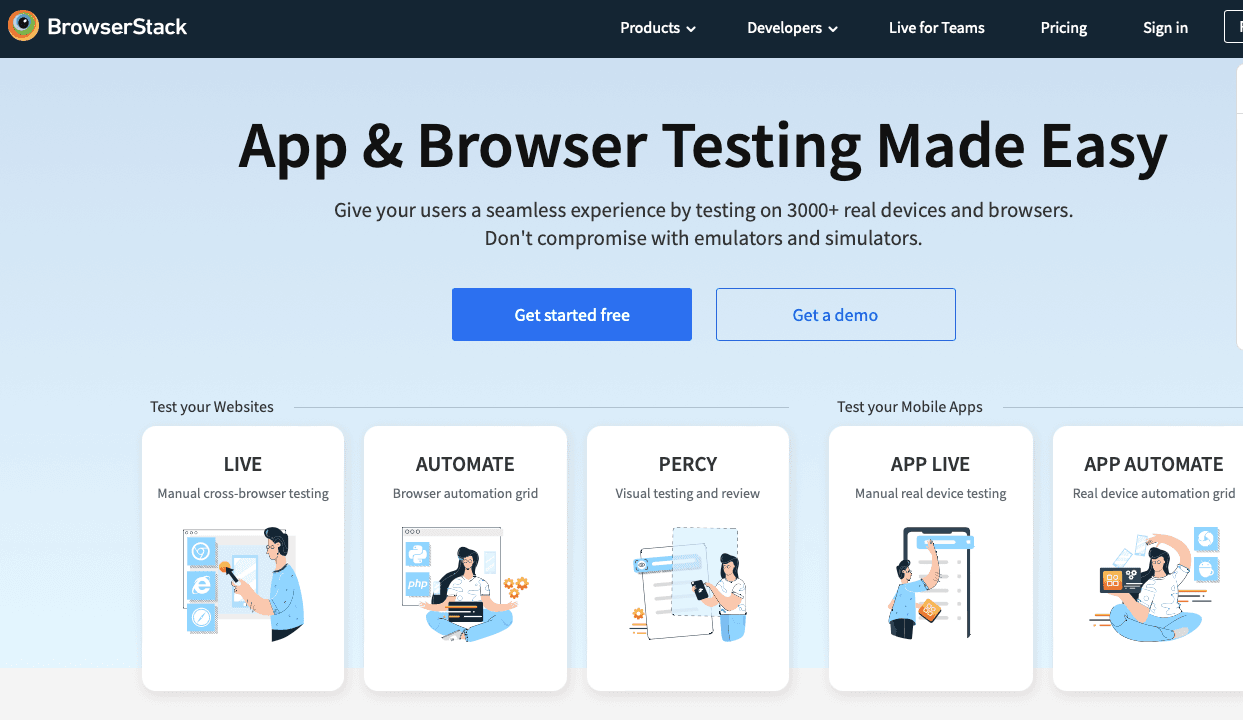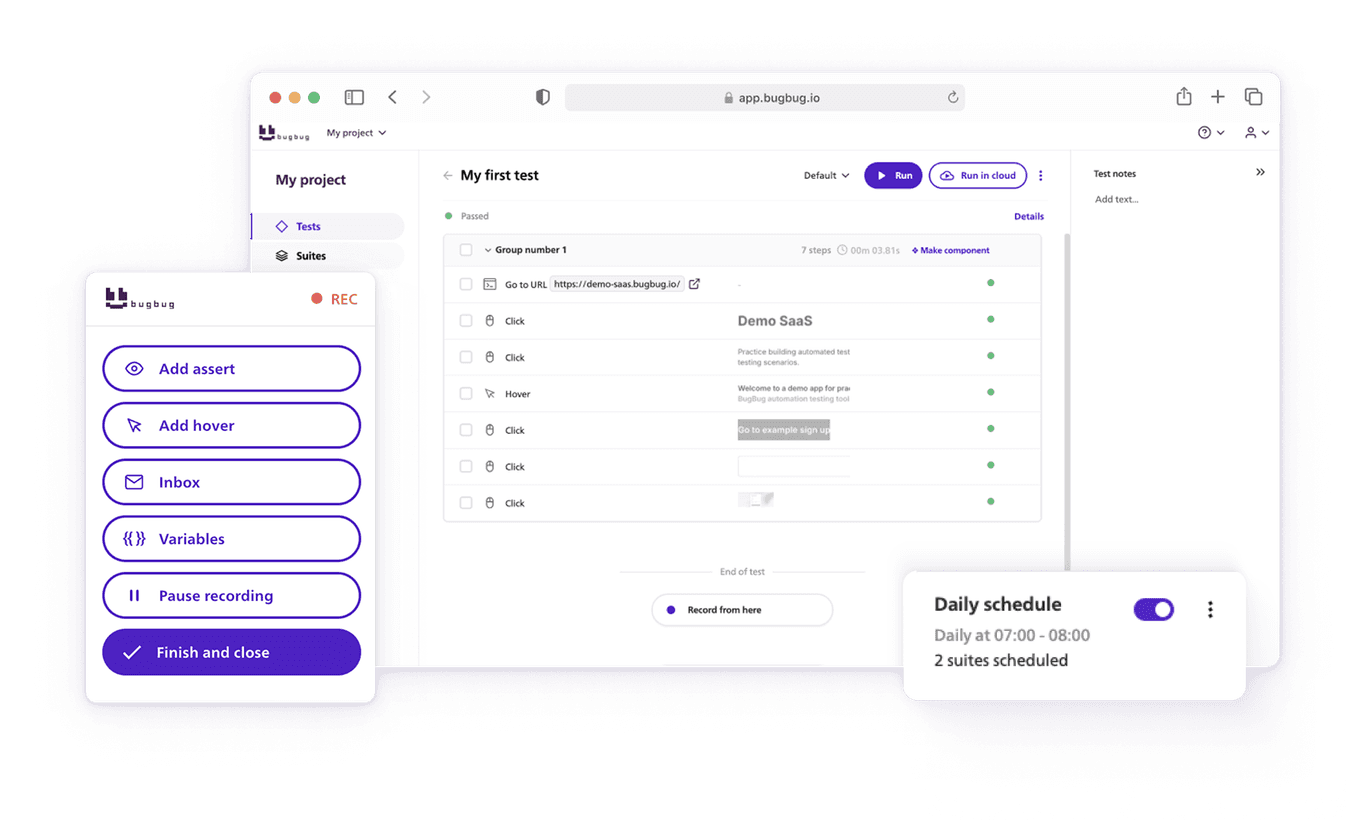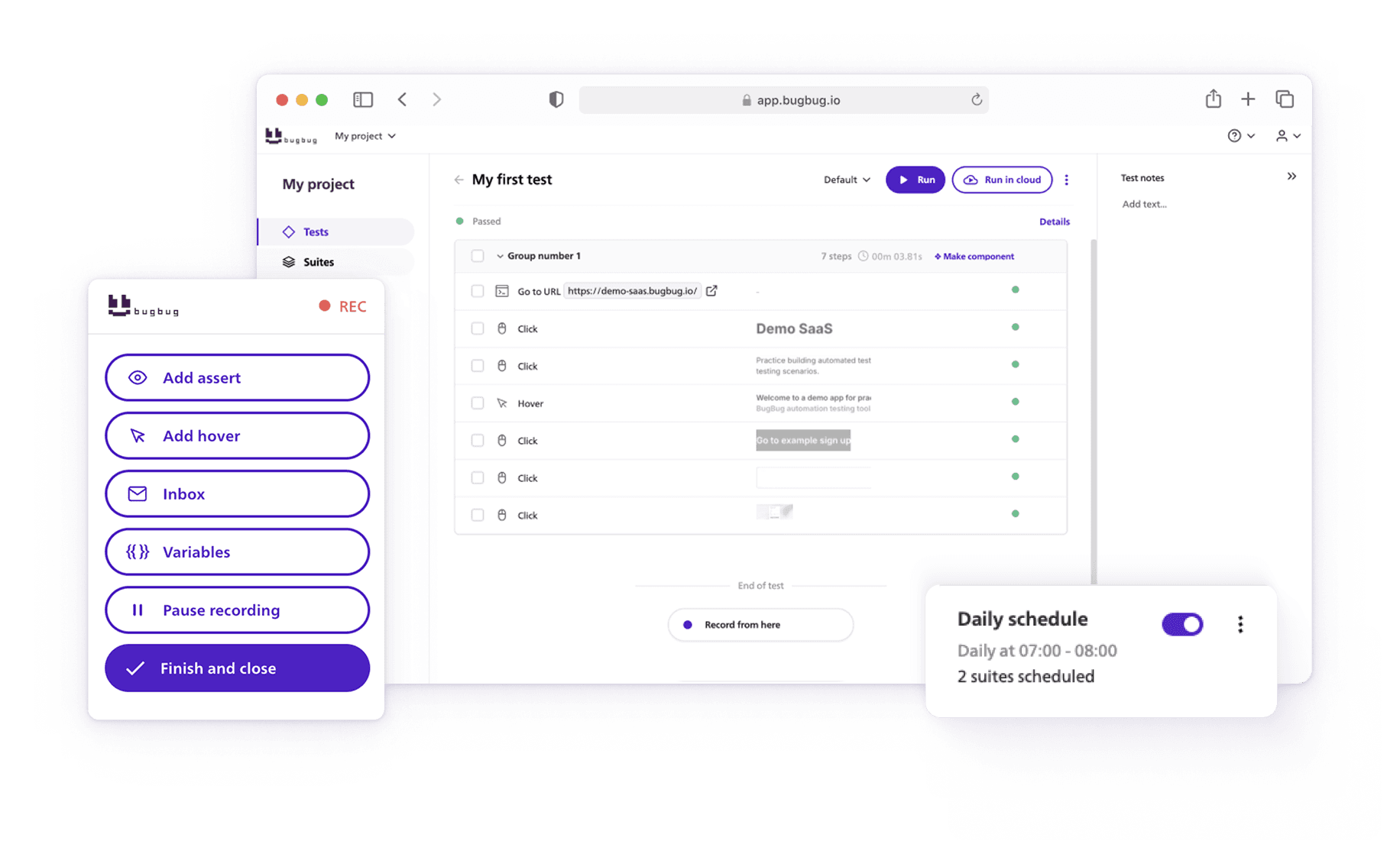If you’ve been relying on Sahi Pro for your automation testing, you might be wondering if it’s still the best fit as your testing needs evolve. With new tools like LambdaTest and BrowserStack offering innovative, cloud-based testing environments, QA teams have more choices than ever when it comes to automating complex workflows. Whether you're looking for better cross-browser testing, seamless cloud integrations, or faster feedback loops in your software testing process, there are powerful alternatives to Sahi Pro that can give your testing strategy a modern edge.
🎯 TL;DR - SahiPro Competitors
- Sahi Pro faces competition from modern tools like LambdaTest and BrowserStack, which offer cloud-based, scalable, and cost-effective alternatives.
- Open-source alternatives such as Selenium and Appium provide flexibility, cost-efficiency, and a large community, making them attractive for teams on tight budgets.
- Sahi Pro's no-code/low-code flexibility is helpful for non-technical users, but developers may prefer more customizable tools like Cypress or TestCafe.
- Modern CI/CD integration, scalability, and community support are key reasons to explore Sahi Pro alternatives for 2024.
SahiPro Alternatives:
-
BrowserStack: Cloud-based platform for manual and automated testing on real devices and browsers; ideal for CI/CD and cross-device testing.
-
LambdaTest: Affordable cross-browser testing tool with over 3,000 browser and device combinations; strong CI/CD integration and visual regression testing.
-
Selenium: Open-source automation framework with wide language support; great for teams needing full control and customization.
-
TestComplete: Commercial tool for web, mobile, and desktop automation; offers AI-powered object recognition and supports both scriptless and scripted tests.
-
Katalon Studio: All-in-one test automation solution for web, mobile, API, and desktop testing; includes codeless options and built-in analytics.
-
BugBug: Lightweight, codeless web app testing tool; intuitive UI, record & playback, cloud/local execution, and “Edit & Rewind” feature.
Check also:
Choosing Sahi Pro alternatives in 2026 comes down to several key factors that are important for software teams of any size, especially those focused on test automation solutions for web and mobile apps. User reviews suggest that while Sahi Pro offers broad test coverage and is a versatile tool, many users are looking for competitors in 2024 that provide easier accessibility, cloud-based test management, and integration with modern workflows.
Many Sahi Pro competitors such as LambdaTest, a cloud-based browser testing platform, offer significant advantages, particularly in terms of cross-browser testing, cloud-based test automation frameworks, and real-time test execution. Free alternatives to Sahi Pro, such as Selenium or Tuskr, a cloud-based test management software, allow teams to scale without the commercial licensing costs that can add up for Sahi Pro users. These competitors and alternatives provide powerful, codeless test automation systems that make it easy to create tests without heavy coding requirements.
Automate your tests for free
Test easier than ever with BugBug test recorder. Faster than coding. Free forever.
Get started
What is SahiPro? Features and Benefits
Sahi Pro is a versatile test automation platform that has gained traction for its ability to automate web, mobile, desktop, Java, and SAP GUI applications. Offering both no-code (via Flowcharts) and low-code (via Classic) options, Sahi Pro caters to a wide range of users, from business professionals to seasoned developers. Its AI Assist add-on further enhances its capabilities by enabling image recognition and machine learning-driven automation. Despite its rich feature set, there are reasons why organizations may consider alternatives to Sahi Pro in 2024.

In this article, we'll explore the pros and cons of Sahi Pro and look at some of the best alternatives for your test automation needs.
Sahi Pro: Pros & Cons
Pros of Sahi Pro
- Wide Technology Support
Sahi Pro covers Web, Mobile, Desktop, Java, and SAP GUI applications, making it a multi-platform solution for teams testing various environments. - CI/CD Integration
Sahi Pro integrates well with popular Continuous Integration/Continuous Deployment (CI/CD) tools like Jenkins, making it easier to incorporate test automation into DevOps pipelines. - Data-Driven Testing
The tool supports data-driven testing, allowing tests to be run with different sets of data inputs. This is especially useful for enterprise applications that need thorough validation with various data combinations.
Cons of Sahi Pro
- Cost
Sahi Pro is a commercial tool, and licensing costs can become a burden for smaller teams or organizations, especially compared to open-source alternatives like Selenium or Appium. - Limited Open-Source Community
Sahi Pro lacks the vast community and third-party plugin ecosystem of open-source tools like Selenium. As a result, customization and finding ready-made solutions for specific issues can be more challenging. - Steeper Learning Curve for Advanced Users
While its low-code/no-code interface is great for non-technical users, developers who prefer coding from scratch may find Sahi Pro restrictive. Tools like Selenium offer more flexibility for writing custom scripts.
Automate your tests for free
Test easier than ever with BugBug test recorder. Faster than coding. Free forever.
Get started
Criteria to Consider Sahi Pro Alternatives

Despite Sahi Pro’s wide-ranging features, there are several reasons why teams may consider switching to alternatives in 2024. Below are the key factors driving the decision to explore other options.
-
Cost Efficiency
The commercial nature of Sahi Pro means that licensing fees can add up, particularly for smaller teams or organizations with extensive testing needs. Open-source alternatives like Selenium or Appium offer similar functionalities without the cost, making them more accessible for teams on a tight budget.
-
Greater Community Support
Sahi Pro has a relatively small community, and the lack of third-party plugins or extensions can limit its customization for specific use cases. On the other hand, Selenium, Cypress, and Appium have vast ecosystems of plugins and libraries, making them more versatile and easier to troubleshoot.
-
Better Developer-Centric Options
Teams with a heavy focus on development may find that Sahi Pro’s no-code/low-code features limit their control over test scripts. Tools like Selenium and TestCafe offer more developer-friendly environments, enabling the creation of complex, highly customizable test cases.
-
Modern Integration Needs
As more organizations embrace DevOps and Continuous Integration, alternatives like Katalon Studio, Ranorex, or TestComplete offer deeper integrations with modern tools, making it easier to integrate test automation into your CI/CD pipelines.
-
Scalability
For large organizations with extensive test automation needs, scalability is critical. While Sahi Pro supports parallel and distributed testing, tools like Selenium Grid or TestComplete offer more robust, scalable solutions that allow tests to run across multiple machines and environments efficiently.
Top 10 Sahi Pro Alternatives for 2026
BrowserStack
Ideal for cross-browser and cross-device testing across a vast range of environments

Key Features:
- Cross-browser testing on real devices and browsers.
- Live and automated testing for web and mobile applications.
- Seamless CI/CD integration with tools like Jenkins, GitHub, and Jira.
- Instant access to real devices and cloud infrastructure without the need for setup.
- Supports Appium and Selenium, allowing users to write their own scripts.
Use Cases:
- Great for teams using CI/CD pipelines to automate web and mobile testing.
- Suitable for companies that need manual and automated testing on real devices.
Strengths:
- Access to real devices and browsers, ensuring accurate testing environments.
- Easy integration with CI/CD pipelines, making it ideal for agile development.
- Supports a wide range of browsers and devices without requiring local setups.
Cost:
- Pricing starts at $39/month for live testing and $129/month for automation testing.
- Enterprise plans are available for larger teams with specific needs.
Limitations:
- Higher costs compared to some other cloud-based tools.
- Limited script customization when compared to open-source tools like Selenium.
LambdaTest
Best for teams needing cloud-based cross-browser testing with a wide range of environments

Key Features:
- Cloud-based cross-browser testing platform supporting over 3,000 browsers and devices.
- Real-time testing and automated Selenium grid in the cloud.
- Smart visual regression testing to catch UI discrepancies.
- Supports CI/CD pipelines with integrations for Jenkins, GitLab, CircleCI, and more.
- Built-in debugging tools, network logs, and screenshots.
Use Cases:
- Ideal for test automation using Selenium and Appium.
- Useful for UI/UX validation and visual regression testing.
Strengths:
- Affordable pricing for smaller teams and startups.
- Comprehensive cross-browser compatibility with thousands of real devices and browser versions.
- Seamless integration with popular CI/CD pipelines and project management tools like Jira.
Cost:
- Free tier available with limited features.
- Paid plans start at $19/month for live testing and $99/month for automation testing.
Limitations:
- Limited support for mobile automation compared to Appium or BrowserStack.
- For larger-scale parallel executions, higher-tier pricing may become expensive.
Selenium
Ideal for highly technical teams that need complete control over their automation scripts

Key Features:
- Open-source and highly customizable.
- Supports multiple programming languages including Java, Python, and JavaScript.
- Works with most modern browsers and platforms.
- Integration with Selenium Grid for distributed execution and cross-browser testing.
Use Cases:
- Best suited for customized web testing and complex automation scenarios.
- Great for teams with experienced developers who can integrate it with CI/CD pipelines.
Strengths:
- Completely free and supported by a large community.
- Highly flexible, allowing full control over test execution and scripting.
- Works with popular cloud platforms like BrowserStack and LambdaTest for cross-browser testing.
Cost:
- Free, as it is an open-source tool.
Limitations:
- Requires advanced technical skills, making it less accessible to non-technical users.
- Lacks built-in support for mobile and desktop testing without additional setups (like Appium for mobile).
TestComplete
Ideal for teams needing automated testing across different platforms, including desktop applications

Key Features:
- Provides cross-platform testing for web, mobile, and desktop applications.
- AI-powered object recognition for automating complex, dynamic applications.
- Offers both scripted and scriptless automation.
- Easily integrates with CI/CD tools like Jenkins and GitLab.
Use Cases:
- Great for those who need AI-based automation for dynamic web pages and elements.
- Suitable for teams seeking codeless automation while still offering scripting options.
Strengths:
- Strong support for AI-driven object identification.
- Flexible options for both scripted and scriptless automation.
- Supports parallel execution for faster test runs.
Cost:
- Paid tool with licensing starting around $6,000/year per license.
Limitations:
- High cost compared to open-source tools.
- Can experience performance issues when working with very large test suites.
Katalon Studio
Best for organizations needing all-in-one test automation across multiple platforms

Key Features:
- Supports web, mobile, API, and desktop testing in a single platform.
- Offers a codeless interface for non-technical users, along with scripting for developers.
- Integrates with CI/CD systems like Jenkins, GitLab, and Azure DevOps.
- Includes built-in test reporting and analytics.
Use Cases:
- Ideal for teams that require quick deployment of both manual and automated tests.
- Useful for API testing alongside functional and UI testing.
Strengths:
- Easy-to-use interface with low-code and scripted testing options.
- Strong support for CI/CD integration.
- Comprehensive support for API and mobile testing.
Cost:
- Free version available with limited features.
- Paid plans start at $69/month for additional features.
Limitations:
- Limited customization for complex test scenarios.
- The free version lacks some advanced features, requiring a subscription.
💡 Check also Katalon Recorder vs BugBug.
Ranorex
Suitable for teams focusing on desktop application testing in addition to web/mobile

Key Features:
- Automates testing across web, mobile, and desktop applications.
- Offers scriptless automation with a drag-and-drop interface.
- Supports CI/CD integration and parallel test execution.
- Comprehensive reporting and analytics tools.
Use Cases:
- Great for organizations that need scriptless automation with drag-and-drop functionality.
- Ideal for businesses requiring detailed reporting and test analytics.
Strengths:
- Excellent for desktop applications (Windows, Java).
- Easy to integrate with CI/CD tools.
- Offers robust analytics and reporting.
Cost:
- Pricing starts at around $3,000/year per license.
Limitations:
- Higher cost for larger teams.
- Learning curve for non-technical users.
Cypress
Best for teams working on JavaScript-heavy web applications

Key Features:
- Designed for end-to-end testing of JavaScript-based web applications.
- Offers real-time test execution and debugging.
- Fast, efficient, and easy to set up for web testing.
- Provides built-in reporting and dashboard features.
Use Cases:
- Ideal for real-time debugging during test execution.
- Suitable for organizations focused on fast and efficient web testing.
Strengths:
- Real-time testing and feedback.
- Quick and easy to set up for JavaScript-based projects.
- Strong support for end-to-end testing.
Cost:
- Free for basic use, with paid plans for the dashboard features.
Limitations:
- Limited to web testing; no support for mobile or desktop apps.
- Not as feature-rich for enterprise-level testing.
Appium
Best for teams needing cross-platform mobile testing

Key Features:
- Open-source mobile automation framework for testing native, hybrid, and mobile web apps.
- Supports cross-platform testing on iOS and Android.
- Integrates with CI/CD tools and supports multiple languages like Java, Python, and JavaScript.
Use Cases:
- Ideal for developers looking for a highly customizable mobile automation solution.
- Useful for teams working with both iOS and Android apps.
Strengths:
- Free and open-source, with a large community.
- Supports a wide range of programming languages.
- Integrates easily with Selenium and CI/CD pipelines.
Cost:
- Free as it is open-source.
Limitations:
- Complex setup and maintenance compared to commercial tools.
- Requires technical expertise for effective use.
Automate your tests for free
Test easier than ever with BugBug test recorder. Faster than coding. Free forever.
Get started
The Codeless Approach for Web App Testing - BugBug

BugBug is a powerful tool for testing web applications, designed to prioritize ease of use and effectiveness in test automation. It caters to both technical and non-technical users, offering a user-friendly interface that allows the creation, editing, and execution of automated tests without requiring extensive coding knowledge. One of its standout features is the web test recorder, providing a simple method for users to automate test scenarios for web applications, making it accessible even for those with limited technical expertise.
Why is BugBug one of the Best Automation Testing Tools?
👾 Intuitive Record and Playback
BugBug’s Record and Playback feature allows users to effortlessly capture interactions with web applications and turn them into automated test steps. This feature is particularly helpful in replaying these steps to identify bugs and verify functionality, ensuring seamless automation without needing manual input.
👾 Automatic Selector Validation and Correction
One of BugBug’s strengths is its ability to automatically verify selectors for accuracy. If any selectors are invalid, users have the option to either manually edit or re-record them, which significantly improves test reliability and accuracy.
👾 Waiting Conditions and Active Waiting
To minimize flaky tests caused by timing issues, BugBug uses active waiting conditions. This ensures that elements are fully loaded and ready before executing the next step, providing more reliable test outcomes and preventing tests from failing due to unexpected delays in element rendering.
You can now start recording or editing test steps at any specific place in a test. The playback position dictates where the recording begins, allowing you to adjust test steps on the fly.
👾 Cloud Execution and Local Testing
BugBug provides the flexibility of running unlimited tests locally or leveraging its cloud infrastructure for parallel test execution across various environments. This speeds up the testing process and allows users to scale their testing efforts effortlessly by running multiple tests simultaneously in the cloud.
Conclusion: Which Tool Should You Choose?
- Choose Sahi Pro if you need a comprehensive, multi-platform automation tool with powerful features like AI-driven object identification, data-driven testing, and parallel execution. It is ideal for large organizations with complex environments requiring desktop, mobile, and SAP automation alongside web testing.
- Choose BugBug if you’re a small to mid-sized team focused on web-only automation, looking for a simple, no-code solution that is easy to set up, affordable, and designed for collaborative testing. BugBug’s lightweight nature makes it great for agile teams that need a quick and efficient web testing solution.
Conclusion
Sahi Pro is a powerful, all-in-one test automation tool with features like no-code and low-code automation, AI-driven object recognition, and broad platform support. However, depending on your needs—whether it's cost, flexibility, or scalability—there are several alternatives worth considering. Selenium, TestComplete, Katalon Studio, Ranorex, and Cypress offer unique advantages, such as deeper developer integrations, open-source flexibility, and more advanced AI capabilities.
Automate your tests for free
Test easier than ever with BugBug test recorder. Faster than coding. Free forever.
Get started
Whether you're working with no-code test automation platforms, AI-powered software testing, or robotic process automation tools, the landscape of Sahi Pro alternatives in 2026 is filled with options that ensure seamless integration with your test automation framework and offer the flexibility to optimize testing. By exploring these top Sahi Pro alternatives and competitors, you’ll find the best-fit solution to support your testing software and ensure your team's success, regardless of your application’s complexity.
Happy (automated) testing!



